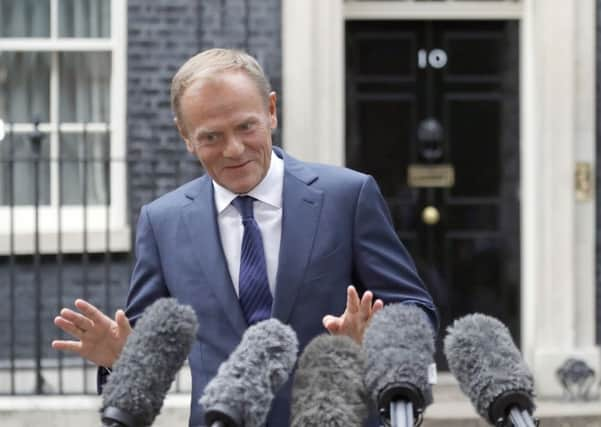Donald Tusk: '˜UK abandons having Brexit cake and eating it'


Mr Tusk made the comments after Downing Street talks with Prime Minister Theresa May yesterday on Britain’s withdrawal from the European Union.
Praising Mrs May’s speech in Florence last week, in which she sought to map out the route to Brexit, Mr Tusk said Britain was now being more “realistic” in its approach.
Advertisement
Hide AdAdvertisement
Hide AdHe said: “I feel cautiously optimistic about the constructive and more realistic tone in the Prime Minister’s speech in Florence and of our discussion today.
“This shows that the philosophy of having a cake and eating it, is finally at an end … at least I hope so. That’s good news.”
The reference was a clear swipe at Foreign Secretary Boris Johnson, who claimed Britain could have its cake and eat it over Brexit.
But Mr Tusk said that not enough progress had yet been made in the Brexit divorce talks to move on to trade negotiations.
Describing Brexit as an exercise in “damage control”, he said: “I feel now we will discuss our future relations with the UK once there is so-called sufficient progress.
“The two sides are working and we will work hard at it.
“But if you ask me, and if today member states ask me, I would say there is no sufficient progress yet. But we will work.”
After the talks a Downing Street spokesman said Mrs May and Mr Tusk had “welcomed the good progress” that has been made on citizens’ rights in the negotiations.
The spokesman said: “At the end of the meeting, the PM said her Florence speech had been intended to create momentum in the ongoing talks. She said it was important for EU negotiators to now respond in the same spirit.”
Advertisement
Hide AdAdvertisement
Hide AdWhile posing for photographs with Mr Tusk at the beginning of the Downing Street meeting, Mrs May said the two leaders agreed that “things have moved on” in the Brexit process. The Prime Minister stressed the need for a “good economic and security partnership” between the UK and EU after withdrawal.
The talks came after the fourth round of negotiations on the UK’s withdrawal from the EU began in Brussels on Monday. Brexit Secretary David Davis has insisted there are “no excuses” for blocking progress to trade talks.
Meanwhile, it emerged yesterday that Britain’s financial regulator is expecting 130 European financial services firms to submit licence applications in order to gain access to the UK market after Brexit.
Sam Woods, chief executive of the Prudential Regulation Authority (PRA) and a deputy governor at the Bank of England, warned that it would be “unwise” for companies to bank on a transitional agreement between the UK and EU, which could temporarily extend cross-border agreements for financial services.
“I think we are likely to see at least 130 applications to be authorised here in the UK,” he said at the Reuters news organisation’s Financial Regulation Summit in London.
The PRA earlier this summer collected details from more than 400 banks and financial firms with cross-border activities between the UK and the EU, including subsidiaries of US investment banks based in London, on their preparations for all scenarios in the Brexit negotiations, including a “no deal” outcome.
But the PRA – which aims to monitor systemic risk and identify credit bubbles – has yet to decide whether the UK branches of EU firms will have to convert into subsidiaries, which would bring them under the regulator’s supervision. Mr Woods said he was likely to make that decision within two to three months, but said that timeline could change if Britain strikes a transitional deal with the EU.